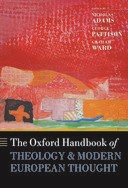 The Oxford Handbook of Theology and Modern European Thought
The Oxford Handbook of Theology and Modern European Thought
Contents
-
-
-
-
-
-
-
-
-
I. Forms of Thought about Suffering I. Forms of Thought about Suffering
-
II. The Making and Remaking of a Theodicy: The Theoretical Approach II. The Making and Remaking of a Theodicy: The Theoretical Approach
-
III. Resignation and Active Suffering: Practical Approaches III. Resignation and Active Suffering: Practical Approaches
-
IV. The Tragic Sense of Life: The Aesthetic Approach to Suffering IV. The Tragic Sense of Life: The Aesthetic Approach to Suffering
-
V. Newer Practical Approaches V. Newer Practical Approaches
-
VI. New Perspectives on Tragedy VI. New Perspectives on Tragedy
-
VII. A New Kind of Theodicy VII. A New Kind of Theodicy
-
References References
-
Suggested Reading Suggested Reading
-
-
-
-
-
-
-
-
-
-
-
-
-
-
-
8 Suffering In Theology and Modern European Thought
Get accessPaul S. Fiddes, Professor of Systematic Theology in the University of Oxford. His books include The Creative Suffering of God and Seeing the World and Knowing God: Hebrew Wisdom and Christian Doctrine in a Late-Modern Context.
-
Published:03 June 2013
Cite
Abstract
This chapter traces the development of theological and philosophical reflection on the phenomenon of suffering in the modern European era. It identifies a shift from theory to practice in the latter part of the twentieth century, indicating a growing impatience with the search for abstract explanations of suffering, and a new stress on the practical issues of how to cope with it. In Christian theology, this shift has been marked by an increasing interest in the relevance of the crucifixion of Jesus for the problems of human suffering, rather than for traditional doctrines of atonement, and this in turn has led back to a kind of theodicy, though with a more practical weight than earlier attempts. Central to this new theodicy has been an affirmation of the suffering of God, overturning centuries of orthodoxy that had insisted on divine passibility and immutability, but following a track marked out already by Hegel and Schelling in the nineteenth century.
Sign in
Personal account
- Sign in with email/username & password
- Get email alerts
- Save searches
- Purchase content
- Activate your purchase/trial code
- Add your ORCID iD
Purchase
Our books are available by subscription or purchase to libraries and institutions.
Purchasing information| Month: | Total Views: |
|---|---|
| October 2022 | 2 |
| November 2022 | 4 |
| December 2022 | 8 |
| January 2023 | 6 |
| February 2023 | 2 |
| March 2023 | 4 |
| April 2023 | 3 |
| May 2023 | 1 |
| June 2023 | 3 |
| July 2023 | 7 |
| August 2023 | 6 |
| September 2023 | 2 |
| November 2023 | 4 |
| December 2023 | 2 |
| January 2024 | 2 |
| March 2024 | 4 |
| April 2024 | 2 |
| May 2024 | 5 |
| June 2024 | 4 |
| July 2024 | 5 |
| August 2024 | 8 |
| September 2024 | 2 |
| November 2024 | 3 |
| December 2024 | 10 |
| January 2025 | 4 |
| February 2025 | 1 |
| April 2025 | 5 |
| May 2025 | 1 |

Get help with access
Institutional access
Access to content on Oxford Academic is often provided through institutional subscriptions and purchases. If you are a member of an institution with an active account, you may be able to access content in one of the following ways:
IP based access
Typically, access is provided across an institutional network to a range of IP addresses. This authentication occurs automatically, and it is not possible to sign out of an IP authenticated account.
Sign in through your institution
Choose this option to get remote access when outside your institution. Shibboleth/Open Athens technology is used to provide single sign-on between your institution’s website and Oxford Academic.
If your institution is not listed or you cannot sign in to your institution’s website, please contact your librarian or administrator.
Sign in with a library card
Enter your library card number to sign in. If you cannot sign in, please contact your librarian.
Society Members
Society member access to a journal is achieved in one of the following ways:
Sign in through society site
Many societies offer single sign-on between the society website and Oxford Academic. If you see ‘Sign in through society site’ in the sign in pane within a journal:
If you do not have a society account or have forgotten your username or password, please contact your society.
Sign in using a personal account
Some societies use Oxford Academic personal accounts to provide access to their members. See below.
Personal account
A personal account can be used to get email alerts, save searches, purchase content, and activate subscriptions.
Some societies use Oxford Academic personal accounts to provide access to their members.
Viewing your signed in accounts
Click the account icon in the top right to:
Signed in but can't access content
Oxford Academic is home to a wide variety of products. The institutional subscription may not cover the content that you are trying to access. If you believe you should have access to that content, please contact your librarian.
Institutional account management
For librarians and administrators, your personal account also provides access to institutional account management. Here you will find options to view and activate subscriptions, manage institutional settings and access options, access usage statistics, and more.